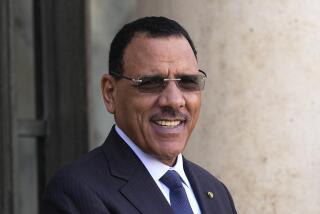Coup in Nigeria Ousts Military Ruler; Corruption and Ailing Economy Cited
- Share via
ABIDJAN, Ivory Coast — Nigeria’s military ruler, Maj. Gen. Mohammed Buhari, was toppled by the Nigerian army in an apparently bloodless coup Tuesday. The army charged that his 20-month-old regime had failed to end corruption and improve the oil-rich nation’s battered economy.
Maj. Gen. Ibrahim Babangida, the army chief of staff, was installed as the new president. Babangida, 42, a Muslim who received his military training in Nigeria and Britain, was a leader of the coup that unseated the elected civilian government of President Shehu Shagari on Dec. 31, 1983, and installed Buhari.
Babangida became a Nigerian hero in 1975 for helping to put down an abortive coup in which the country’s popular military leader, Brig. Gen. Murtala Mohammed, was assassinated. He also became Nigeria’s kingmaker, specialists on Nigerian affairs said.
“No coup could have succeeded without Babangida and no countercoup would happen without his sanction,” one source said.
The fate of Buhari was not immediately known. A former oil minister, he had accused the Shagari government he replaced of “mismanagement and corruption.”
The coup was the sixth in black Africa’s most populous and richest nation since its independence from Britain in 1960. No violence was reported in the latest takeover.
In a statement over Lagos radio, Brig. Gen. Joshua Dongonyaro announced the coup and imposed a nationwide dusk-to-dawn curfew. He also closed the country’s airports and seaports and halted all telex and telephone communications.
A radio announcement from Maj. M.K. Delvi, of the Kaduna regiment of the Nigerian army, said the country was “calm and under control.”
In recent years, the economy of Nigeria, a nation of at least 80 million in an area more than twice the size of California, has fluctuated with international oil prices. Oil brought Nigeria an economic boom in the 1970s, but the slump in prices brought a recession in the 1980s that was made worse by the corruption and mismanagement of the elected government. The country now has a foreign debt of $15 billion and an inflation rate of 40%.
The military seized power at the end of 1983 in what Babangida at the time called “a New Year’s present to the nation,” promising to stamp out corruption.
The Buhari government that took power early in 1984 acted drastically to help the economy. It set up new courts and passed laws calling for death by firing squad for counterfeiters, drug traffickers and people making unauthorized deals in oil. Hundreds of officials were arrested and many were imprisoned, some for terms as long as 22 years.
Nigeria’s land borders were closed to try to stop smuggling, and hundreds of thousands of illegal immigrants were expelled to make their jobs available to Nigerians.
But inflation grew, and consumer goods, even including staple foods, remained in short supply. Businessmen said they could not get permits to import vital spare parts.
Dongonyaro accused Buhari of having “betrayed and discarded” the original aims of the 1983 coup.
“We could not stay passive and watch a small group of individuals misuse power to the detriment of our national aspirations and interest,” Dongonyaro said in the statement monitored in the nearby Ivory Coast. “The government had started to drift. The economy does not seem to be getting any better as we witness daily increased inflation.
“The Nigerian armed forces, therefore, decided to bestow the reins of the administration of this nation on Maj. Gen. Ibrahim Babangida, as the president and the commander in chief of the armed forces of Nigeria.”
Gen. Sanni Abacha said on Lagos radio Tuesday evening, “It is now abundantly clear . . . that the past leadership lacked the capacity and the capability of leading this nation out of its economic and social predicament.”
Abacha called the state of the nation’s economy “more and more deplorable. The sale of our crude oil is deteriorating . . . to below our OPEC quota.”
He said the “life of the ordinary people of this nation is becoming increasingly unbearable.”
Western diplomats in London and Paris said Lagos was calm, including the area around the presidential headquarters, with no special troop movements noted.
In Santa Barbara, Calif., White House spokesman Larry Speakes said the 7,000 Americans in Nigeria appeared to be safe.
“Lagos is calm and radio announcements are encouraging peace and calm,” Speakes said. “There have been no reports of incidents involving American citizens, and our embassy in Lagos does not believe American citizens or other foreigners throughout the country are in any danger.”
In London, a spokesman for the Foreign Office said he had no reports of trouble involving the 11,000-strong British community. Britain ruled Nigeria from 1861 until granting independence in 1960.
More to Read
Sign up for Essential California
The most important California stories and recommendations in your inbox every morning.
You may occasionally receive promotional content from the Los Angeles Times.













